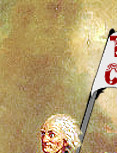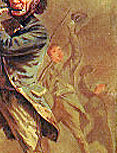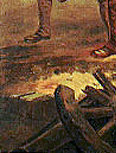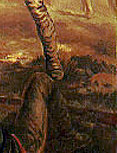There
were a few bumps in the implementation of the new
policy. The biggest of these was the refusal of a
good many Filipinos to accept the Americans as their
new landlords in place of the Spaniards. It took a
costly war to make good this part of the real estate
deals made in the Treaty of Paris. The war – which
the Americans chose to call "the Philippine Insurrection"
– quickly became a war against the Philippine people
generally, that is, a counter-insurgency comparable
to what Spain had been running in Cuba before US intervention
and what the British had going in South Africa against
the Boer-Afrikaner nation down to 1903.
Ultimately,
the war and the costs of administering the islands
soured American leaders on formal colonies like the
Philippines or British India. Thereafter, they would
pursue neo-mercantilist empire on an "informal"
basis by ruling through apparently independent local
leaders – as in Cuba, Nicaragua, etc. – bought and
paid for by the US taxpayer. This allowed greater
flexibility and was cost-effective when it worked,
but led, sometimes, to awkward episodes in which a
foreign employee of the Americans – Batista, Somoza,
the Shah, there may be others – "suddenly"
was seen to be a despot from whom the Americans must
distance themselves minutes before his overthrow by
an unhappy populace. In other cases, employees have
misunderstood or disobeyed their instructions – Noriega,
Saddam Hussein – and have to be corrected. Even informal
empire has its drawbacks.
THE
ANTI-IMPERIALIST LEAGUE
In
response to the bloody counterinsurgency in the Philippines,
critics founded the American Anti-Imperialist League.
Their goal was to combat the "large policy,"
empire, and colonialism. For the most part, the Anti-Imperialists
were classical liberals who espoused free markets
and free trade. Many had ties to the old antislavery
movement.
V.
I. Lenin called the Anti’s the "last of the Mohicans
of bourgeois democracy" – which is true enough.
Prominent members of the League included industrialist
Andrew Carnegie, Boston textile magnate Edward F.
Atkinson, former Senator Carl Schurz, writer Mark
Twain, and philosopher William James. Former President
Grover Cleveland was at least a sympathizer. Atkinson
stirred up all kinds of trouble when he sent anti-war
pamphlets to American troops in the Philippines. To
stop this "sedition" the government seized
the pamphlets before they arrived in the field.
It
has been suggested that the upper class character
of the League kept it from leading the broad public
against overseas imperialism. Certainly, there were
critics of empire – generally referred to as "expansion"
– outside the League, but neither the League nor anyone
else welded them into an effective opposition to empire.
Nor was the election of 1900, which pitted the incumbent
McKinley against the populist Democrat William Jennings
Bryan, much of a "referendum" on the policy
of empire. Bryan made little use of the issue, having
apparently decided that it wasn’t much of a vote-getter.1
THE
‘PHILIPPINE INSURRECTION’: MASS GRAVES AND ‘FREE-FIRE
ZONES’
With
McKinley safely elected, along with his ineffable
new Vice President Teddy Roosevelt, the pacification
of the Philippine Islands dragged on. Whole districts
were declared combat zones – "free-fire"
zones in effect – and US troops were allowed to follow
the positivist rules of warfare drawn up by Francis
Lieber for Lincoln’s War Department in 1862. Under
these rules, inhabitants of such areas were assets
to the enemy and their lives, rights, and property
at the mercy of US commanders, who were sole judge
of the "convenience" of letting the people
enjoy continued use of those things.
Given
the difficulty of distinguishing the insurgents from
the population, American soldiers began killing Filipinos
wholesale. Stories of indiscriminate warfare, mass
graves, "concentration" of civilians into
camps (cf. "strategic hamlets"), and atrocities
like the "water torture" began trickling
home. In the end, about 220,000 Filipinos perished
in the war. The greater number of these died from
disease, disruption of food supplies, and other causes
linked to the war, rather than from actual combat.
The overall "tone" was that of an overseas
Indian war, a circumstance doubtless connected with
the fact that many US officers in the Philippines
were veterans of the last such wars.2
The
islands were "pacified" and American proconsuls,
Progressive bureaucrats, and anthropologists could
get on with the important business of finding willing
local collaborators within the Filipino elite, the
ilustrados, and getting Philippine resources
such as timber, coconuts, and cattle into the hands
of deserving US corporations. In Cuba, US occupation
authorities oversaw a virtual "enclosure movement,"
alienating land from smaller landholders – a
task made easier because departing Spanish bureaucrats
took all the land records with them. Whether this
overall approach to expanding commerce, which shifted
the costs of finding, rigging, and holding new markets
onto the taxpaying public, was the best possible one,
went unanswered. Anti-imperialists inside and outside
of the League sought to supply answers.
CRITICS
OF THE RISING AMERICAN EMPIRE
As
the administration set forth to govern overseas subjects
without their consent, the Anti-imperialist League
remarked that "it has become necessary in the
land of Washington and Lincoln to reaffirm that all
men, of whatever race or color, are entitled to life,
liberty, and the pursuit of happiness. We maintain
that governments derive their just powers from the
consent of the governed. We insist that the subjugation
of any people is ‘criminal aggression’ and open disloyalty
to the distinctive principles of our Government."3
In
Our New Departure (1901), Moorfield Storey
observed that an inhabitant of Puerto Rico had "no
American citizenship, no constitutional rights, no
representation in the legislature which imposes the
important taxes that he pays, no voice in the selection
of his executive or judicial officers, no effective
voice in his own legislature…. This is government
without the consent of the governed. This is what
is meant by ‘imperialism.’"
Further:
"To impose our sway upon them [the Filipinos]
against their will, to conquer a nation of Asiatics
by fire and sword, was the abandonment of every principle
for which this country had stood."4
From
the relative safety of Toronto, English classical
liberal Goldwin Smith, an ally of the Anti-Imperialists,
also wrote of the Americans’ new departure: "When
the people of the United States, after recognizing
the Filipinos as their allies, bought them with their
land [from] Spain, as they would buy the contents
of a cattle-ranch or a sheep-fold, and proceeded to
shoot them down for refusing to be delivered to the
purchaser, they surely broke away from the principles
on which their own polity is built, and compromised
the national character formed on respect for those
principles." The then-prevalent atmosphere of
Jingoism was a factor, along with a misreading of
Darwin, "as if the strongest were the fittest,
which, though true in the case of brutes, is untrue
in the case of the moral and intellectual being, Man."
Economic
motives also entered in, Smith said: "Over-production,
which seems to prevail in the manufacturing countries,
begets a general craving for new markets." Hence,
the recent actions of the powers in China and the
late South African (Anglo-Boer) War. We can forgive
Smith for accepting the "over-productionist"
rationalization at face value when he writes that
"commerce" achieved by empire was a snare
and a delusion: "Will the Chinese market, for
instance, be improved by a carnival of slaughter and
destruction, with inevitable famine in its train?
Will not the price of conquest itself be a formidable
offset to the profit? Last year’s profit of trade
with the Philippines is miserably small as compared
with the expenditures on the conquest." But some
people did gain from imperialism: "It is true,
the expenditure falls on the public, the gain accrues
to the trader, who is active in support of a policy
which serves his interest, while the public yawns
over the dry details of national finance."5
THE
NATURE OF THE CRITICS’ CASE
The
turn-of-the-century anti-imperialists made arguments
from classical liberalism, republican theory, and
constitutional principles. They argued that liberal/republican
principles were incompatible with ruling overseas
populations without their consent. The Constitution
could not be stretched that far without serious damage
to its intellectual integrity. In their search for
constitutional ground, some critics of empire even
quoted Chief Justice Roger B. Taney, who wrote in
Dred Scott v. Sandford (1857) that "no power
[was] given by the constitution to the Federal Government
to establish or maintain colonies… to be ruled and
governed at its own pleasure, nor to enlarge its territorial
limits in any way except by the admission of new states."
For Anti’s to cite Taney was a little ironic, since
they were heirs of the antislavery cause and Taney
had been denying the power of Congress to exclude
slavery from continental territories. Nevertheless,
the point itself was sound enough as republican theory.
The
Anti-Imperialists warned of executive dominance in
government, of militarism, constitutional decay, and
all the rest. And, of course, on the expansionists’
own premises the process looked to be endless. As
William Graham Sumner, laissez faire liberal
and Yale sociologist, put it: "We were told that
we needed Hawaii in order to secure California. What
shall we now take in order to secure the Philippines?.…
We shall need to take China, Japan, and the East Indies,
according to the doctrine, in order to ‘secure’ what
we have. Of course this means that, on the doctrine,
we must take the whole earth in order to be safe on
any part of it, and the fallacy stands exposed. If,
then, safety and prosperity do not lie in this direction,
the place to look for them is in the other direction:
in domestic development, peace, industry, free trade
with everybody, low taxes, industrial power."6
AN
OPPOSITION TRADITION
Sumner’s
most famous essay was entitled "The Conquest
of the United States by Spain." By this he did
not mean that Spain had won the late war but that
the Spanish principles of overseas imperialism had
conquered the minds of the US leadership. In different
ways, critics of war and empire have made the same
argument over and over again. It is interesting that
Harry Elmer Barnes edited a series of books on US
imperialism in the 1920s and ‘30s and that John T.
Flynn had, as a young man, listened to the debates
in Congress on Philippine annexation. However weak
it may be in institutional continuity, there is indeed
an American anti-imperialist tradition. In that tradition
the anti-imperialists of 1900 played an important
part, even if their League disbanded within a few
years of its founding.
Notes









